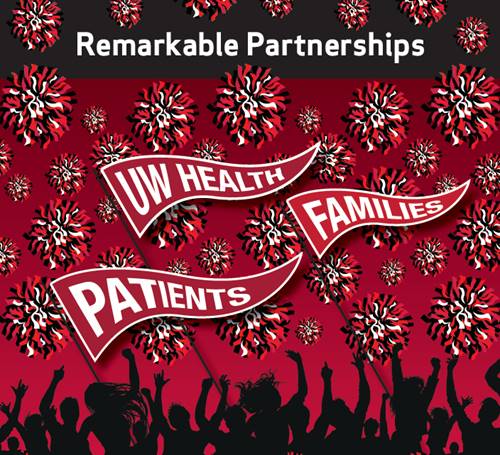
UW Health is the integrated health system of the University of Wisconsin-Madison. UW Health consists of 7 hospitals and 87 outpatient sites, including University Hospital, UW Health at The American Center, American Family Children’s Hospital and UW Carbone Cancer Center. UW Health’s extensive Patient and Family Advisor Partnership Program began in 2006 when the first two Patient and Family Advisory Councils (PFACs) were created at the children’s hospital and University Hospital.
In 2011, the program expanded to include primary care and the development of a Primary Care PFAC, specifically to guide primary care redesign efforts. As part of UW Health’s five-year primary care redesign initiative, a pilot group of 9 care teams met regularly and analyzed the way they delivered care. Then they developed and tested improvements, such as reducing wait times, improving patient education, and management of chronic diseases. The Primary Care PFAC disbanded in 2016 with the conclusion of the Primary Care Redesign work, but PFAs remain involved in committee work on specific projects in primary and specialty care environments.
Currently, PFAs serve on several top-level quality and safety committees, such as the UW Health Quality Council, Nursing Quality Council, and Resident Quality and Safety Council.
To manage its growing Patient and Family Advisor Partnership Program, UW Health maintains:
- Staff position of Program Manager, Patient and Family Advisor Partnerships
- Resources for staff outlining how to partner with PFAs on improvement teams, standing committees, and additional PFACs
- Webpage for recruiting PFAs: UW Health PFA Partnership Program

Approximately 200 PFAs serve on 12 PFACs as well as on dozens of standing committees or quality councils and short-term improvement teams throughout the UW Health system. PFAs also serve as volunteers in an innovative program to observe and give feedback on provider communication skills in the newly created Communication Advisor Program. The vision of the program is: “Patients, Families and UW Health: Partners in Transforming Care.”
According to Sandra Kamnetz, MD, Vice Chair, Clinical Care Department of Family Medicine and Community Health, “Having patient and family advisors involved re-centers our entire organization and staff on why we do the work we do. It is not a job but, instead, service to our patients: our true North. When you ask, ‘What does the patient want?’ it stops the physician from saying, ‘This is too hard or not what I think should be done.’ And, we can ask that question through our patient and family advisors.”
The PFACs listed below include a focus on primary/ambulatory care and/or services provided in outpatient specialty clinics:
- American Family Children’s Hospital
- Heart, Vascular and Thoracic Care
- MyChart
- Northeast Family Medical Center
- Oncology/ Breast Center
- Pediatric Cystic Fibrosis
- Psychiatry
- Transplant
- UW Health (covering topics touching all patients at UW Health)
Psychiatry PFAC
UW Health's psychiatry and psychology services emphasize assessment, treatment and management of mental health concerns for patients of all ages. Providers offer medical and therapeutic interventions in both outpatient and inpatient treatment settings for individuals and their families. The UW Health system includes several outpatient clinics offering behavioral health services.
The Patient and Family Advisor Partnership Program extended into mental and behavioral health in 2014. The Psychiatry Patient and Family Advisory Council has been instrumental in improving the quality of patient care for children, adolescents and adults with mental health needs seen throughout UW Health. Up to 12 PFAs serve on the Council at a given time. Over the years, they have been involved in several key projects.
The PFAC has worked toward integrating behavioral health services into primary care practices in the following ways:
- Making clinics more welcoming to patients by including diversity in literature, artwork, and accessibility with a focus on comfort and privacy.
- Creating public messages to reduce stigma and inform patients about the availability of mental health services throughout UW Health.
- Developing a comprehensive Behavioral Health page for the UW Health website highlighting the institution’s value of “partnering to promote mental health and well being.”
Other notable PFAC accomplishments in recent years:
- Worked with clinicians to publish a blog on mental health topics.
- Advocated for better access to services, helping build support to hire more providers.
- Helped streamline family therapy referrals, informing the creation of a self-assessment tool for family therapy readiness.
- Updated flyers for group therapy services.
- Helped create suicide prevention article.
Current co-chairs Emily Comstock and Anne Totero describe the significance of the PFAC:
“Being a member of the Psychiatry PFAC has been a rewarding and interesting experience. I have been a part of this PFAC since its inception and I have learned so much and am impressed by how much the PFAC has been able to give to the Department of Psychiatry. While we have made suggestions that have improved some aspects of service to patients, we have also become increasingly aware of some of the challenges that the Department has faced over the years. I believe our learning has made us stronger advocates.” - PFA Co-Chair, Emily Comstock
“This PFAC reduces barriers to providing the best care to our patients. No longer is there a feeling of “us vs them” (providers vs patients). PFAC has taught me that growth and change come from relationships, connectedness and sharing ideas. I keep coming back to the thought that PFAC involvement is not only recommended; it’s required to make positive change. It has been extremely pivotal in how I care for people.” - Staff Co-Chair, Anne Totero, MS, LMFT